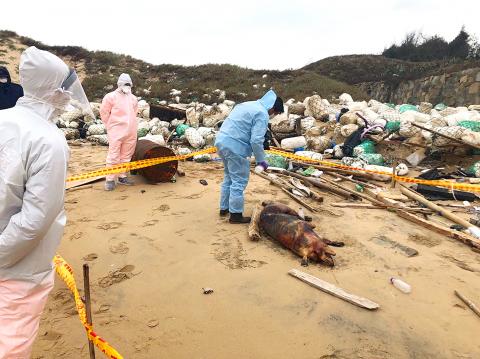Test results conducted on a pig carcass found in outlying Kinmen County earlier this week were positive for African swine fever, the Council of Agriculture confirmed yesterday.
The dead hog was found on Monday on a beach in Kinmen County’s Jinsha Township (金沙) by Coast Guard Administration personnel just kilometers away from China’s southeastern coast, raising concerns that the outbreak of the swine disease in China could spread to Taiwan.
Samples collected from the dead animal were sent to the council’s Animal Health Research Institute for testing, which indicated that the pig was infected with the disease, institute head Chiu Chui-chang (邱垂章) said yesterday.

Photo: EPA-EFE
It was not known whether the dead hog floated to Kinmen from China or if it originated from a local farm, Bureau of Animal and Plant Health Inspection and Quarantine senior official Hsu Jung-pin (徐榮彬) said.
Authorities have begun carrying out inspections at Kinmen’s hog farms for a possible African swine fever infection, Hsu said.
Kinmen has 68 pig farms, with about 11,000 hogs.
None of the 190 pigs at a farm close to where the dead hog was found have shown any signs of infection, the Kinmen County Government said.
As a precaution, from today, imports of pork from Kinmen to Taiwan proper would be suspended for two weeks, council Acting Minister Chen Chi-chung (陳吉仲) said.
Should any of the pigs exhibit symptoms of the disease, such as a loss of appetite or lethargy, authorities would carry out tests, Hsu said.
In the event of a positive result, the hogs would be culled, followed by the cleaning and disinfection of the premises to prevent the disease from spreading, he said.
Since the first confirmed case of the swine disease was reported in China’s Liaoning Province in August last year, Taiwan has been on high alert, worried that the spread of the extremely deadly virus could devastate the nation’s NT$80 billion (US$2.59 billion) pig farming industry.
To prevent the disease from reaching Taiwan, the government has slapped heavy fines on travelers who bring in pork products from areas affected by the disease, with first-time offenders liable to be fined NT$200,000 and repeat offenders up to NT$1 million.
In light of the positive test results, Premier William Lai (賴清德) is to convene an interministerial meeting today to discuss the matter, Executive Yuan spokeswoman Kolas Yotaka said.
Additional reporting by Lee Hsin-fan

US President Donald Trump yesterday announced sweeping "reciprocal tariffs" on US trading partners, including a 32 percent tax on goods from Taiwan that is set to take effect on Wednesday. At a Rose Garden event, Trump declared a 10 percent baseline tax on imports from all countries, with the White House saying it would take effect on Saturday. Countries with larger trade surpluses with the US would face higher duties beginning on Wednesday, including Taiwan (32 percent), China (34 percent), Japan (24 percent), South Korea (25 percent), Vietnam (46 percent) and Thailand (36 percent). Canada and Mexico, the two largest US trading

AIR SUPPORT: The Ministry of National Defense thanked the US for the delivery, adding that it was an indicator of the White House’s commitment to the Taiwan Relations Act Deputy Minister of National Defense Po Horng-huei (柏鴻輝) and Representative to the US Alexander Yui on Friday attended a delivery ceremony for the first of Taiwan’s long-awaited 66 F-16C/D Block 70 jets at a Lockheed Martin Corp factory in Greenville, South Carolina. “We are so proud to be the global home of the F-16 and to support Taiwan’s air defense capabilities,” US Representative William Timmons wrote on X, alongside a photograph of Taiwanese and US officials at the event. The F-16C/D Block 70 jets Taiwan ordered have the same capabilities as aircraft that had been upgraded to F-16Vs. The batch of Lockheed Martin

GRIDLOCK: The National Fire Agency’s Special Search and Rescue team is on standby to travel to the countries to help out with the rescue effort A powerful earthquake rocked Myanmar and neighboring Thailand yesterday, killing at least three people in Bangkok and burying dozens when a high-rise building under construction collapsed. Footage shared on social media from Myanmar’s second-largest city showed widespread destruction, raising fears that many were trapped under the rubble or killed. The magnitude 7.7 earthquake, with an epicenter near Mandalay in Myanmar, struck at midday and was followed by a strong magnitude 6.4 aftershock. The extent of death, injury and destruction — especially in Myanmar, which is embroiled in a civil war and where information is tightly controlled at the best of times —

China's military today said it began joint army, navy and rocket force exercises around Taiwan to "serve as a stern warning and powerful deterrent against Taiwanese independence," calling President William Lai (賴清德) a "parasite." The exercises come after Lai called Beijing a "foreign hostile force" last month. More than 10 Chinese military ships approached close to Taiwan's 24 nautical mile (44.4km) contiguous zone this morning and Taiwan sent its own warships to respond, two senior Taiwanese officials said. Taiwan has not yet detected any live fire by the Chinese military so far, one of the officials said. The drills took place after US Secretary